Leave for 6 months in South Africa: Complete Guide for an Unforgettable Adventure
Find out in this article how to spend 6 months in South Africa: formalities, budget, accommodation, safety, possible internships, solidarity missions or study trips. Experience a unique cultural and human adventure.
Contents : spend 6 Months in South Africa
- 1. Introduction
- 2. Why spend 6 months in South Africa?
- 3. Choose your plan: volunteering, studies, internship or simple stay
- 4. Preparing for departure: administrative formalities and visa
- 5. Budget and funding for a 6-month stay
- 6. Finding accommodation in South Africa: options and advice
- 7. Safety and health: precautions to take
- 8. Discovering South African culture
- 9. Solidarity missions and volunteering opportunities
- 10. Studies and internships: opportunities for students
- 11. Working or looking for temporary employment
- 12. Social impact: how to get involved sustainably
- 13. Which regions to prioritize?
- 14. Everyday life on site: transport, food, leisure
- 15. Long-term stay challenges
- 16. Testimonials and feedback
- 17. FAQ: Spending 6 months in South Africa
- 18. Conclusion: a transformative adventure
- Recap: key points
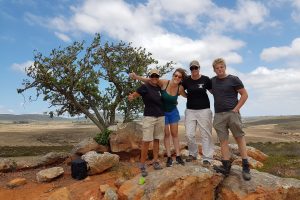
1. Introduction : spend 6 Months in South Africa
Spending 6 months in South Africa means giving yourself the chance to discover a country of a thousand facets: an impressive cultural diversity, landscapes ranging from savannah to ocean beaches, and a rich history shaped by apartheid and the Renaissance of the “Rainbow Nation”. Whether you’re an student, a young professional, a volunteer looking for a solidarity mission, or simply a traveler eager for exoticism, staying six months in South Africa can be an intense and life-changing experience.
In this article, we review all the steps to organize your project: visa, budget, accommodation, safety, health, culture, humanitarian missions, professional opportunities… The goal? To provide you with a complete guide to setting off with peace of mind and making the most of this long-term stay in South Africa.
2. Why spend 6 months in South Africa?
1) Discover a multicultural country
South Africa has eleven official languages and is home to a mosaic of communities. A 6-month stay will really allow you to connect with different cultures, from cosmopolitan cities such as Johannesburg or Cape Town to more rural villages.
2) Explore breathtaking nature
Mountains, safaris, Atlantic coastline, vineyards… The country offers a unique variety of landscapes. Six months will give you time to hike Table Mountain, observe the Big Five in Kruger Park, and enjoy the beaches of KwaZulu-Natal.
3) Understand South African history
From apartheid to the current democracy, South Africa has gone through profound upheavals. Visiting the Apartheid Museum, Robben Island or Soweto township will immerse you in a recent and poignant past.
4) Immerse yourself in social and economic dynamism
As the first industrialized country in Africa, South Africa attracts start-ups and investors. It’s also a center for social innovation, with a strong involvement of associations in the fight against inequality.

3. Choose your plan: volunteering, studies, internship or simple stay
To spend 6 months in South Africa, you have several options:
- International volunteering or humanitarian mission: perfect for getting involved in educational, environmental, health projects, etc.
- University exchange program: if you’re a student, you can spend one semester (or two) at a South African university.
- Internship in a company or NGO: to gain professional experience in an English-speaking, multicultural setting.
- “Working Holiday” visa (if available): though less common than in Australia or New Zealand, check if agreements exist for temporary work.
- Long-term tourist stay: if you have the means, you can travel throughout the country and deepen your knowledge of various regions.
Your choice will depend on your goals: to validate a degree internship? Solidarity project? Gap year? Visa and accommodation conditions vary according to your plan.
4. Preparing for departure: administrative formalities and visa
Spend 6 Months in South Africa
1) Passport
Make sure you have a passport valid for at least 6 months after your return date. South African authorities are strict on this point.
2) Type of visa
Generally valid for 90 days, renewable in certain cases, but not always for 6 months.
If you’re leaving for a university exchange, your host university must provide the relevant documents.
3) Supporting documents
Depending on the type of visa, prepare: acceptance letter, proof of financial resources, health insurance, round-trip plane ticket, etc. Check the South African embassy website for the updated list.
4) Processing time and cost
Procedures can take several weeks. Anticipate to avoid last-minute stress.

5. Budget and funding for a 6-month stay
1) Plane ticket
Expect between €500 and €1,000 for a round trip, depending on the season. Book early and compare airlines. Flights to Johannesburg are often slightly cheaper than Cape Town.
2) Accommodation
Shared housing is available, depending on the city. Prices are higher in Cape Town or Durban and cheaper in rural areas.
3) Cost of living on site
Generally lower than in Western Europe, but varies: a restaurant meal can cost between €5 and €10, a minibus-taxi ride less than €1. Imported products are more expensive.
4) Additional expenses
– Health insurance (€30-€60/month).
– Visa (€50-€200).
– Leisure, safaris (entrance to national parks can be a significant budget).
5) Funding solutions
– University grants (Erasmus+ if there’s an agreement between institutions, or regional grants).
– Crowdfunding: online fundraiser.
– Personal savings: a 6-month stay requires some financial reserves.
6. Finding accommodation in South Africa: options and advice
Spend 6 Months in South Africa
1) Host families
Some volunteering projects offer homestay accommodation. Cultural immersion is total, and costs are lower.
2) Youth hostels and backpackers
Popular among travelers. Not necessarily ideal for 6 months, but convenient when you arrive to look for permanent accommodation.
3) Shared housing
A very common solution if you plan to stay several months. Facebook or specialized groups can help you find a room. Ask the association or partner university for advice.
4) Student residences
If you are enrolled at a university, ask about on-campus housing (rooms, studios) or private residences nearby.
5) Townships
Avoid living there unless you fully understand the culture and speak the language, since some areas are more sensitive in terms of safety. It’s better to go through an organized, supervised mission.
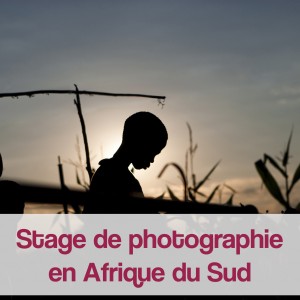
7. Safety and health: precautions to take
1) Safety
South Africa has a high crime rate, especially in certain neighborhoods of major cities. Follow guidelines: don’t walk alone at night, avoid showing valuables, use official taxis or ride-hailing services. Ask locally about risky areas.
2) Health
– Drinking water: generally considered safe in big cities, but ask locally.
– Vaccines: update your universal vaccinations, possibly hepatitis A/B, typhoid, etc.
– Malaria: present in some provinces (Mpumalanga, Limpopo). If you plan to go there, take anti-malarial prophylaxis.
– Hospitals: well-equipped in urban areas, but public vs private: private is expensive, so health insurance is essential.
3) Insurance
Take out international insurance covering medical expenses and possible repatriation. Check reimbursement limits.
8. Discovering South African culture
Spend 6 Months in South Africa
1) Languages
Afrikaans, Zulu, Xhosa, English… English is commonly spoken in urban and tourist areas, making communication easier.
2) Gastronomy
Try “braai” (South African barbecue), biltong (dried meat) or bobotie (Malaysian curry dish). You can feel Indian, Malaysian, and European influences in the food.
3) Music and dance
Traditional Zulu rhythms coexist with more modern genres (kwaito, house). Attending a gumboots dance performance is often a highlight.
4) Tradition and modernity
Between the downtown skyscrapers and traditional villages, the contrast is striking. The interplay between urban and rural cultures is part of the country’s charm.
9. Solidarity missions and volunteering opportunities
If your goal in spending 6 months is to get involved in a solidarity mission, several fields are particularly active in South Africa:
- Education: homework help, literacy, support to disadvantaged schools.
- Child protection: orphanages, childcare centers in townships.
- Ecology and wildlife: contribution to conservation programs (wildlife reserves, reforestation).
- Women’s empowerment: training, entrepreneurial assistance.
- Micro-development projects: urban agriculture, promotion of renewable energies.
Contact international or local organizations (via a reliable intermediary) to find the mission best suited to your skills and wishes.
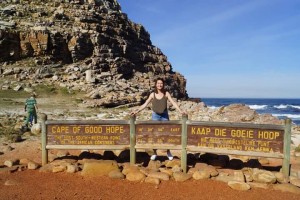
10. Studies and internships: opportunities for students
1) University exchange
Several South African universities (University of Cape Town, University of the Witwatersrand, Stellenbosch University…) run exchange programs. Ask your home institution about their partnerships.
2) Internship in a company or NGO
Ideal for validating a semester of studies or gaining initial international experience. Key sectors: tourism, digital marketing, project management, health, finance, etc.
3) Scholarships and grants
Check out existing programs (regional grants, Erasmus+ if there’s an agreement, etc.). The French embassy in South Africa sometimes offers programs to encourage mobility.
11. Working or looking for temporary employment
If you plan to work in South Africa during your 6 months, know that the job market is competitive. A specific work visa is required for paid employment. Foreigners are particularly sought after in sectors like tourism, hotels, catering, education (language lessons), NGOs, etc.
Some opportunities exist in Cape Town start-ups (tech, digital), but legislation tightly controls foreign hiring to protect local employment. Prepare an English CV and apply in advance to maximize your chances.
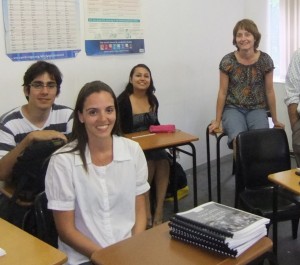
12. Social impact: how to get involved sustainably
By staying 6 months, you have time to build relationships and have a deeper positive impact than just passing through. Think about:
- Sharing your skills: train a local team, document your processes so that work can continue after you leave.
- Respecting local approaches: do not impose a Western model, but adapt to actual needs.
- Maintaining contact afterwards: follow the project’s progress, provide remote support if possible.
13. Which regions to prioritize?
Cape Town
A cosmopolitan city with incredible scenery (Table Mountain, Cape Point), a dynamic cultural scene. More touristic and international.
Johannesburg
Economic heart, museums about the apartheid era, neighborhoods undergoing revitalization. A high-energy city but with higher crime rates.
Durban
Located on the Indian Ocean coast, known for its subtropical climate and its Zulu and Indian mix. Surf vibes, spicy cuisine.
Limpopo and Mpumalanga
Rural areas, close to wildlife parks (Kruger Park). Great for wildlife conservation volunteers.
Western Cape region
Vineyards, mountains, stunning coastline. Perfect for those who love hiking and gastronomy.
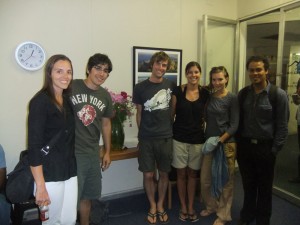
14. Everyday life on site: transport, food, leisure
Transport
– Minibus-taxis: popular and cheap, but be cautious about safety.
– Uber / Bolt: widely used in urban areas, safer at night.
– Train / Intercity bus: for traveling between provinces.
Food
– Huge variety: Zulu, Afrikaner, Indian, etc.
– Fresh fruits and vegetables at affordable prices, barbecue (braai) everywhere.
– Restaurants: €5 to €10 per dish, depending on the establishment.
Leisure and entertainment
– Bars, clubs, movie theaters, concert halls, museums… especially in big cities.
– National parks (Kruger, Table Mountain, etc.) for nature and wildlife.
15. Long-term stay challenges
1) Adapting to the local pace
The first few weeks can be unsettling. Give yourself time to settle in, to understand the functioning of local society.
2) Dealing with loneliness or homesickness
Being away from loved ones for 6 months can create a sense of missing home. Schedule regular video calls, find French-speaking or international friends on site.
3) Keeping a controlled budget
Outings, safari weekends, or purchases can quickly eat into your savings. Make a realistic financial plan.
4) Staying legally compliant
Plan to renew a visa if needed, adhere to the legislation to avoid illegal stay issues.

16. Testimonials and feedback
17. FAQ: Spending 6 months in South Africa
17.1. Can you leave with just a tourist visa?
The standard tourist visa is often limited to 90 days. You may be able to request an extension, but it’s not automatic.
17.2. How much does it cost to live in South Africa?
The cost of living is generally lower than in Western Europe. A monthly budget of €400 to €600 (excluding accommodation) may be enough, but it depends on your lifestyle, the city, and activities.
17.3. Is safety really an issue?
It can be in certain neighborhoods, especially at night. By following basic precautions (don’t show valuables, use reliable taxi services, avoid isolated places after dark), you significantly reduce the risks.
17.4. Is it possible to work there to finance your stay?
It depends on the visa. A work visa or a specific visa is required for legal paid employment. South African authorities are strict. However, for an internship, an internship visa is enough, and it can sometimes include an allowance.
17.5. What is the best time of year to go?
The climate varies by region. Usually, the peak tourist season is during the austral summer (December-February). For a 6-month stay, you’ll experience several seasons anyway. Get information about the specific region that interests you.
18. Conclusion: a transformative adventure
Spending 6 months in South Africa means living an intense immersion in a country with a fascinating history, a flourishing culture, and magnificent landscapes. Whether you choose a humanitarian mission, an internship, studies, or a road trip, you will come out of it changed. There is no shortage of challenges—safety, adaptation, budget—but the richness of the encounters and the self-discovery make it well worthwhile.
By carefully preparing your project (visa, housing, goals, insurance) and approaching the experience with an open mind, you will make these 6 months in South Africa an unforgettable chapter of your life. From Johannesburg’s urban bustle to Durban’s beaches, through the wild beauty of the Western Cape, the country welcomes you to offer a human adventure like no other.
Ready to spend 6 months in South Africa? Discover our programs
Recap: key points for spending 6 months in South Africa
- Clarify your project: volunteering, internship, studies, extended tourist stay, etc.
- Learn about visas: standard tourist visa often covers only 90 days.
- Set a budget: flight (€500–1,000), accommodation (€200–400/month in a shared place), insurance, everyday expenses.
- Consider safety: risk areas, basic precautions, traveling by reliable taxi.
- Choose your region: Cape Town, Johannesburg, Durban, national parks… based on your goals.
- Discover the culture: 11 languages, varied cuisine, complex history. Open yourself to diversity.
- Get involved in a solidarity project: humanitarian mission, community assistance, wildlife protection.
- Handle culture shock: adaptation time, building local contacts, staying modest and curious.
- Highlight the experience upon return: a plus on your CV, a story to share, and possibly new projects in Africa.
Now you have everything you need to spend 6 months in South Africa with full knowledge of what’s involved. Embark on this adventure, and let the “Rainbow Nation” reveal its many colors and incredible energy!
For more information, feel free to contact us at [email protected]
To learn more about the Globalong Association and its members, visit us on Instagram, Facebook, LinkedIn and Youtube !

